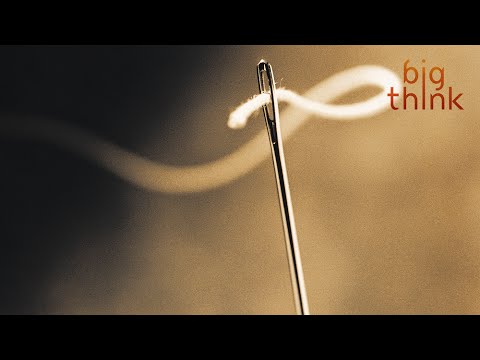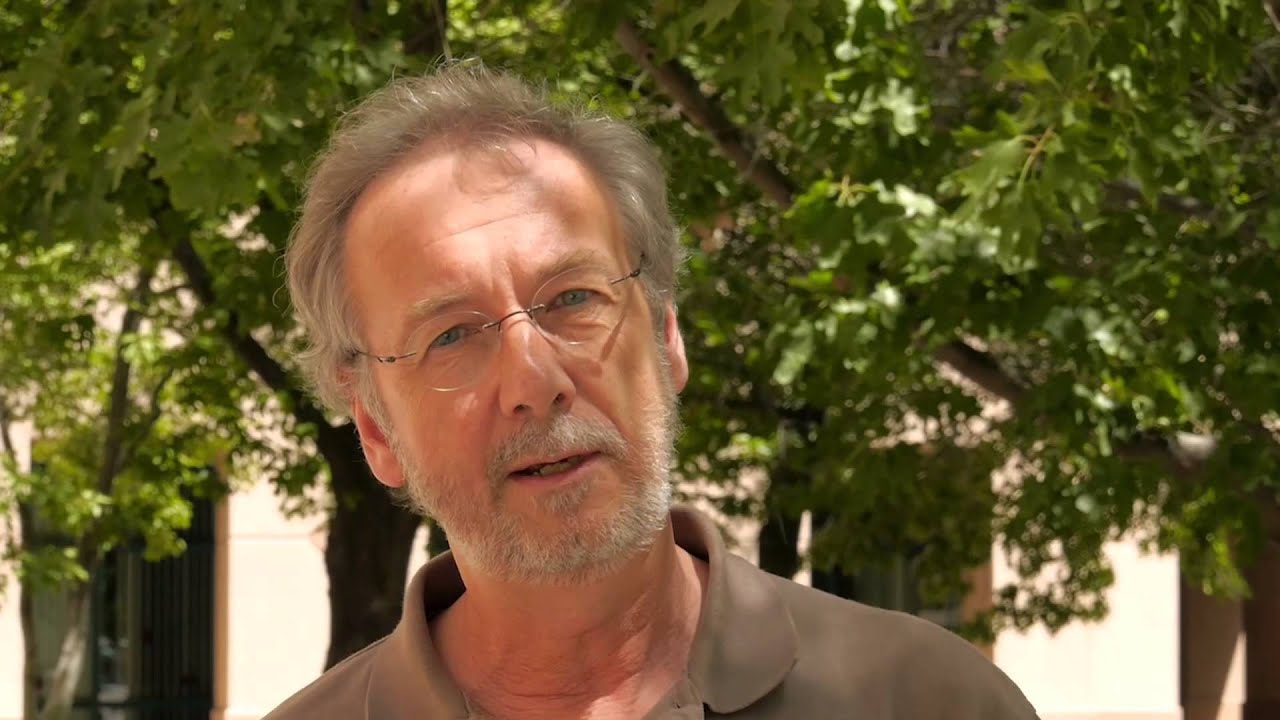Big Think
If you’re interested in licensing this or any other Big Think clip for commercial or private use, contact our licensing partner Executive Interviews: https://www.executiveinterviews.biz/rightsholders/bigthink/
What if beliefs could be surgically inserted into a patient’s brain? This is the basis of one of philosopher Daniel Dennett’s thought experiments in exploration of how the brain represents beliefs. Dennett argues that individual beliefs are part of broader idea systems and that they couldn’t possibly be stored like a library of belief sentences.
For the full playlist go to BigThink.com: http://bigthink.com/playlists/daniel-dennett-how-to-think-like-a-philosopher
Follow Big Think here:
YouTube: http://goo.gl/CPTsV5
Facebook: https://www.facebook.com/BigThinkdotcom
Twitter: https://twitter.com/bigthink
Transcript – One of the problems that’s beset philosophers and cognitive scientists for the last 30, 40 years is how on earth the brain represents information. An eternally appealing idea is something like a language of thought that there’s brain writing or mentalese and we write — the brain writes sentences in mentalese that store the beliefs so that when you learn that giraffes are mammals, there’s someplace in your brain where the word — the mental word giraffe and the word mammal are tied together with a “is a” or something like that. So we have a big library of sentences. Those are our beliefs.
We have a belief box with lots of beliefs. That’s an attractive idea of nice — it has a certain simplicity that — and we think we understand how sentences work to store information. Well now, if that were so, could a clever enough neurosurgeon wire in a false belief just out of the blue. So, let’s imagine that our neurosurgeon decides to wire into our brain the belief that you have an older brother living in Cleveland. So he figures out how to write that in brainish and does all the microsurgery and there it is written in brainish in your brain.
Okay, you wake up from the anesthetic and so he says, “Yeah, do you have any siblings?” Well, if he’s done his work well I guess the first thing you do is you say, “Yes, I have an older brother living in Cleveland.” “Oh, what’s his name?” And now what? Ah, ah, ah — one of several things has to happen. Maybe you’ll start confabulating and you’ll say, umm, his name is Alfonso, and, um um he’s a taxi driver, and he lives with his wife and two kids in the suburbs. That’s one possibility. In other words, you couldn’t just wire in one belief. You’d have to wire in something which generated a whole slew of beliefs. Alternatively, maybe you would say, “Oh my gosh. What did I just say? I said I had an older brother. I don’t have an older brother. I have a sister or I’m an only child. What made me say that?” In that case, what we would see is that whatever the surgeon did, it wasn’t wiring in a belief because as soon as you reflected on it, boom, it just vanished, it disappeared.
Well, if it’s a belief then it’s gotta be secured to a lot of other beliefs. That’s just in the nature of belief. You can’t have an isolated belief like I have an older brother living in Cleveland. If that state was one that you seem to be in, we’d want to explore it to see what came along with it. And either we would decide that you had some weird sort of growth in your brain that made you fixate on a sentence, sort of parrot like. And you’d say, “I’m an only child and I have an older brother living in Cleveland.” Which, of course, would be contradicting yourself. What we wouldn’t decide is that you believed you had an older brother living in Cleveland.
What this little thought experiment shows is that beliefs don’t parcel themselves out the way sentences do. You could take any sentence on any topic and write it on any medium you like and put it in a drawer and there it would be. Beliefs aren’t like that. They come in systems. They cohere in large clumps. This is sometimes called holism and there’s still some theorists who think that holism is a bad idea. I think it’s got to be the case. Holism is a good idea. That a particulate non-holistic theory of believe is a non-starter.
Directed / Produced by Jonathan Fowler, Elizabeth Rodd, and Dillon Fitton
Source




Good question.
Thank you
Maybe it wouldn't vanish.
Perhaps the person would go on to say that they don't remember or know the sibling's name, occupation, but that they're sure they have them.
That might depend on the person. Maybe based on things like how analytical or stubborn they are.
And perhaps the newly installed belief in an older brother would overwrite thier awareness of being an only child. Being aware of being an only child is basically the awareness of not having siblings. So installing the belief that they have a sibling might make them no longer claim they're an only child.
But then they mght remember claiming that all of their life.
At that point, it seems the newly installed belief would either vanish, because it contradicts so much of the other info in the brain, or the person might claim they forgot about the sibling and that the memmory of something they were unaware of for as long as they can remember suddenly came back.
At least that's my thoughts on it, I don't claim to "know" any of this for certain, obviously.
Actually most of your beliefs are incomplete and separate from any recognizable system, existing alone in a vacuum. To illustrate this, try asking someone why they believe in a number of things. Some of these things will give them befuddled pause after which they will indeed begin to fabulate.
There's a whole lot more to this view – a view by the way I was naïve enough to have thought was a) unassailable and b) of my own invention.
Much respect to Daniel Dennett. Although him and Sam harris disagree on the lack of free will, they both are very intelligent and important to the atheist movement
did someone hack this video? when I shared it, the title changed to: daniel dennett, stop telling people they don't have free will.
@thijsjong
Too obvious a link ? Seriously ? Why is there always an ignorant imbecile to come here and ruin every video with pro or anti religion statements that have nothing to do with the material being talked about ?
Please go hump yourself and leave. You are exactly the same type of person as those who make comments about Jesus Christ and how science is a fallacy, the only difference is that your god is science, and just like them, you completely ignore both your own religion (science), and their's. Despite knowing nothing of religion, you make comments about how certain religions say certain things. How pathetic. And then you put complex human behaviors onto religion, just as dumb as a priest from the middle ages saying masturbation will give you syphilis.
What you are saying has no meaning by the way. Some religions ? That's like saying "Some people like do drink beer. But others like to drink wine. A comparable mindfuck".
This guy here on the video is talking about interesting concepts of science and psychology, please don't come here and spill your ignorance juice all over us. Until you have something worth while to say, leave or shut up. Thank you.
I don't get what the point of this is
If you open up a brain, can you point to me where I experience my belief? Can you cut out a thought?
Thoughts, beliefs, emotions, only exist in awareness….
how about the music fades in after he is done speaking..
amazing and scary at the same time!!
Holding parents and preachers liable for implanting falsehoods into the minds of children should be taken into consideration when dealing with the mythological stories associated with religion.
there is a problem with the sharing of this video link. it comes up with this title instead: Daniel Dennett: Stop Telling People They Don't Have Free Will. and also the incorrect description.
try taking the address for this video, and paste it into facebook, see what I mean. the link says it is a different video.
Dennett is not clever, novel, or scientific… the fact that many circles consider him an intellectual is purely due to the coattails he rides…. List to this video, its all just useless, unfounded babble…
Normally, a person who has an older brother living in Cleveland would have a lot of other accompanying beliefs like what his name is and so forth because it's hard not to know more about someone the person likely had a lot to do with growing up, but it absolutely is possible to believe that you have an older brother and where he lives without knowing anything else about him. For example, your mother may have just confessed a dark family secret that she gave up a son for adoption some years before you were born and that this son is now living in Cleveland and has just contacted her through the adoption agency.
That beliefs are often related to each other in complex networks is presumably a fact about how they are typically acquired. The fact that these relationships typically exist doesn't tell us that they have to.
To take another example, this time of a false belief. Suppose you regularly confuse Al Pacino and Robert De Niro, and so have been going around for some time thinking Al Pacino was the star of Taxi Driver. This belief should be easy to correct by just watching the film again or looking it up on IMDB, so it would be difficult to argue that it depends on a network of other beliefs in a highly interrelated way. How is it represented in the brain then if not in the form of something like an independent proposition?
How did Big Think get santa clause?
ppl with cotards syndrome have isolated beliefs.
You build an enormous recursive superstructure of beliefs about the universe.
Then you have children who begin the process yet one more time.
Then you die and lose it all.
What's the point?
A chain of loss.
why does every fuckin comment on this vid have to be about religion… this was the first good vid i seen in a while too bad there's no good discussion in the comments
I think its more interesting how words resable our thought. I wonder if you could program someone into living their lives by reading… Lol, a bit paranoid but that would atleast set new scales for my understanding of Masshypnosis
I felt like putting a bullet between the eyes of every Panda that wouldn't screw to save its species. what ever could survive does still exist. natural selection… I know… its easy to say when you're on top but than again if one is not than one can't understand the argument idea and so does not matter
Salam. Good topic, and remains the word "coherent". It works also with language: a coherent language allows a coherent understanding. This works perfectly in physic and mathematics.
Actually, it has already been done. They have 'programed' lab rats to 'believe' a room of a certain color was bad for them, without the rat ever entering the room, or even seing it's color.
So, yes. In theory, we can now 'control' peoples beliefs. I believe it would work just has he drescribed it (very much like dreams do, and was seen in the movie 'Inception'). We are given the 'seed' and them our subconsciende fill in the blacks. This is proven science.
Kind of reminds me of a couple of the case studies in Oliver Sacks' Man Who Mistook His Wife For a Hat. There were a couple of cases where people whose memory or cognitive capabilities were seriously disrupted would indeed confabulate in the manner Dennett describes here, inventing realities to support 'beliefs' that would come and go almost at random.
When did Santa become a philosopher?
Ya cualquier pendejazo lee un libro sobre el cerebro, se deja crecer la barba, se rapa y ya se creen genios iliminados pinche tartamudo
Dudes stach needs a trimmin…
I'm more concerned why this Dudes brother wants to live in Cleavland, he must be white…
great video
@thijsjong,
We do have free will, but I didn't learn that through religion; placing religion at the centre of an inquiry into free will is a waste of time because religion is concerned with self-empowerment (collection of converts) and self-preservation (retention of faithful). At the end of the day, we don't have any evidence for or against many religious claims; it's exacerbated by the fact that religious thinkers are frustratingly circular logicians with one answer: god did it; which to me translates as, 'I don't know, but I have faith in something I haven't seen.' which is basically filling in the gaps in our knowledge with whatever we want the answer to be — based on our social and cultural beliefs. Which takes me back to my point: it's a waste of time.
In my opinion, the sciences provide us with the best methodology for inquiries into whether we have free will or not. Knowledge in biological psychology (evolutionary biology, especially evolution of neurobiology) and its methods of inquiry will give us a better insight into whether we have free will.
So anyway, back to the question at hand: do we have free will? — any time we are conscious we have free will to manipulate our bodies and the environments around us. According to Oxford dictionary, free will is defined as, "the power of acting without the constraint of necessity or fate; the ability to act at one’s own discretion." It's basically the power to override determinism. Determinism: "actions are ultimately determined by causes regarded as external to the will:"
And so the answer to whether we have free will is in the brain and the world we inhabit.
I believe we required hundreds of millions of years of evolution (billions if you want to go into the building blocks of life e.g. gravity, the stars and life-birthing elements, oxygen and carbon) to get to a point where we, as a species, have a relatively well-functioning nervous system with the brain sitting on the top. It's taken that long for favourable conditions for consciousness — aka free will — to thrive, beginning with individuals' adaptation to environment followed by evolution. All thanks to adaptation and evolution (those external determiners of brain evolution), we have gradually moved from earth life (is there such a thing?) to plant life to conscious but instinctive animals to the complexities of human thought processes.
Human free will can be suppressed: we know that doctors are able to restrict our consciousness using anesthesia inducing drugs when they are operating on us; when they do we are incapable of free will. The brain is the evidence we are looking for. The search for supernatural entities controlling the brain, the tissues of the body, the cells, the elements, the atoms and the most elementary of particles and so on is a fruitless endeavour at least for the foreseeable future. We don't have to look much farther than our brain as a tangible source, whose evolution and function gave rise to the free will we take for granted.
On the other hand, we are able to suppress the deterministic effects of evolution and genes because our brain has the capacity for growth and change: essentials for free will. By virtue of our free will we can override the warnings we get when our hands are burning on a hot pan. So even though we are a highly intelligent species we could give rise to a stupid species if the conditions are right in the same way other hominid species had the evolutionary plasticity to give rise to a species like us.
I think it's better to ask what percentage determines non-free will and what percentage of our brain is the source of our free will. I've always struggled with absolutes (e.g. 100% deterministic) and know it's not quite right.
Please don't take as fact because I am not a scientist nor claim to be highly intelligent…but I do have small amounts of relevant knowledge that I prefer to make use of.
What about the possibility that you hold the belief you have an older brother, and when you can't retrieve any memories of him you attribute it to memory loss, but the belief has been wired in your brain so you still hold it with conviction in spite of the lack of memory? Dennett hardly entertained all the possibilities here.
I think thoughts are too abstract to be written in a language as we typically understand. The language part of thinking comes with the seamlessly neverending monologue some have in their minds, or when formulating it into actual words. But it could also be a "brain language" like a code or something, did I just make my own argument invalid? ;s
well, i AM the youngest child, and i DO have a little brother living in nanaimo. because i volunteered fro Big Brothers.
its Hershel
Or alternatively you might say "I have a brother in Cleveland" and when asked what's his name you could just reply "I don't know, I've never met him. I just know I have a brother in Cleveland". Point being you could programme just one belief.
Or you might know someone who says "I have a personal relationship with Jesus Christ!" Mhhhmm, right…. Fing robots..
I don't know that I agree with the idea that you cannot hold an isolated belief. And of course, the term "belief" in and of itself is a strange one. Something concrete, such as having an older brother, would be like saying that I believe the sky is blue. This is an isolated belief as far as I'm concerned. Can someone please further explain the logic presented here?
This guy is above the cut at making his words understandable. Sometimes trying to decipher what someone has just said leaves my brain somewhat hampered.
TLDR. Question is how do we know that our word "belief" has any correspondence to actual brain function at all? Seems "belief" is just a conceit of philosopy with zero grounding in science.
Here's a thought, and it is mine, that we don't store memories at all. We build and rebuild small networks that give an output based on an input. And these are connected (and connected and …) to form the complexity of our beliefs. Surely this makes holism the only answer.
wrong
Im not here for Bill Nye. Hes kinda a jerk.
lol
Code it in Brainish.
From my experience this is how religious people store their beliefs: 3:07
He says 'a particulate non-holistic theory of belief is a non-starter'. I could make a joke deriding whoever but all I have to say is that this might well be the case for a lot of people that beliefs are particulate rather than following holistic framework. I think this guy has selective observations when it comes to other people and doesn't see the gaping holes in their fundamental beliefs proving the beliefs are particulate. We're 'designed' to live in small communities rather than in a large civilisation. The collective mind of the small tribe is what is stable not necessarily the individual parts. Just look at what happened when we started living in large civilisations. The worst violence the human race has ever known and we still aren't sure why any of it happens. In small tribes it's more obvious why the violence happens when interacting with rival tribes but in civilisation, killing happens simply because people hold contradictory beliefs in their head. Our beliefs can be held in a particulate way for big portions of the population. In fact all you have to do is to ask someone what the evidence is for god and you get a firmly set smattering of particulate beliefs. I don't mean to say god is or isn't real I'm just saying most people can't rationally assess their own ideas. beliefs can definitely be particulate IMO
It doesn't just go for religion some people genuine reject the belief that they have siblings or they will believe they have siblings that they've never met or they just 'feel in their soul' that they have siblings, it's just that reality hasn't shown it to them yet etc. They just much rather not talk about these things as they know they will be laughed at etc. Delusion isn't uncommon
Thought experiments are just-so-stories.
A good journalist producing a well written article based on skewed truths, aka fake news, could beat that neurosurgeon in a race of implanting false beliefs.
So in short… a notion/meme-network… therefore a system of beliefs.